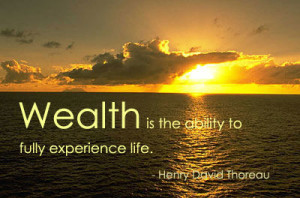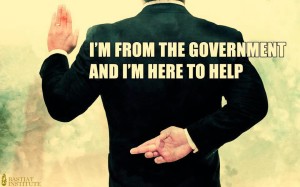By Paul Rosenberg, FreemansPerspective.com
This was a big phrase in the 1960s, as young people turned away from
the corporate conformity of the 1950s and decided that they wanted more
out of life than being an adequately-fed cog in a big machine.
Let’s be honest and admit that the modern corporate script involves
selling your own wishes and dreams for paychecks. I know that a lot of us have played along with it because of necessity, but this is not a way of life to cling to, it’s a way of life to escape.
You are meant to live your life. Yes, I know it can seem hard, but
it’s the only life that’s really worth living. You have to give meaning
to your life, and you’ll never get it by following the televised script and hoping for pats on the back from the people who are playing along with you.
This life you have is precious. Human beings are engines of creation;
we are able to imagine and to turn our imaginations into reality. And we
are capable of supercharging our creative abilities by sharing our lives
and loves with other people. We are astonishingly capable creatures.
Don’t waste all your life’s abilities in a corporate cubicle. You’ve
already seen how that goes: Work excessive hours, go home tired, watch
TV, sleep, and start over. Your kids end up in mini corporate worlds
called “schools,” where they are taught to sit, be quiet, obey, and turn
off their internal desires and loves. If you play that game you’ll miss
most of your life in the process, as well as most of your children’s
lives.
Once you get some corporate inertia going, it is all too easy to get
sucked into it permanently. Don’t let that happen to you.
So, here’s my modern (and slightly adjusted) interpretation –
Tune In, Turn On, Drop Out:
Tune In
Wake up and see the world as it is. Turn off the
talking heads on TV and get to know the real world. Stop spending all
your brain cycles on celebrities, sports heroes and gossip hounds – get
to know your neighbor and the old woman who lives around the corner,
strike up a friendship with someone on the other side of the world. Travel. Spend your time with real people; get to know them, and reveal yourself to them. It only seems weird because the people who programmed you didn’t want you to think freely.
Do you think I am being dramatic by referring to “the people who
programmed you”? If so, read this:
Education should aim at destroying free will so that
after pupils are thus schooled they will be incapable throughout the rest of their lives of thinking or acting otherwise than as their schoolmasters would have wished.
That was from the highly esteemed Bertrand Russel, by the way, and
I’ve got plenty more of them. Take this seriously, because your
programmers have been.
Tune in to yourself rather than your programming: What do you really
want? Most people can list a dozen things that bother them, but not a
single thing that they really want. This is a problem. Find out what you
want. What do you love? What do you want to work for?
Do you remember all those times in the Bible where Jesus berates
people for being “hypocrites”? Well, the real word he used was actors –
as in stage actors. And whether you are religious or not, this is
crucial: Stop acting in someone else’s play. Take off all the masks and
find yourself.
Turn On
Start doing what you love. Don’t wait for someone else, do it
yourself. Start helping your friends and neighbors, spend serious time
with your children – not at a game or a party, but just you and them,
talking. Find out what they love. Tell them what you love, what you are
proud of, what you regret. Tell them you love them. Tell them things you
don’t tell your friends. Let them know you.
Start living, not merely existing. DO the things you feel an urge to
do. And don’t fall into the usual trap of “what if I make a mistake?”
That’s simply fear-based conditioning. Resist it. Do what you love, and
in so doing, you will turn yourself on.
Are you going to go through your whole life and never follow your own
wishes, always sacrificing them to the tyranny of other peoples’
opinions? Please don’t do that to yourself – you’ll suffer greatly for
it when you’re old.
Screw all the expectations and turn on – act on your own will.
Drop Out
Stop wasting your time and energy on governments and arguments and
politics. Drop out of their mindset and start reclaiming all those
wasted hours. Lying politicians are simply not worth your devotion. Drop
the endless party fights and stop arguing about them. Politics is ugly,
and politics on the brain makes us ugly.
Stop paying attention to the hundreds of ads you see every day – they
are scientifically designed to grab your thoughts. Turn away. Stop
buying trendy things, and definitely stop buying things for the purpose
of impressing other people.
Stop trying to fit in, and stop living according to other people’s
expectations. Let them call you weird. Let them talk about you. Stop
caring about it. If they were real friends, they wouldn’t treat you like
that. So if they are willing to call you names, you’re better off
dropping them now.
Don’t fight the system – that just keeps all of your energy and
attention focused on them. Forsake the system and start creating a
better life for yourself, the people you love and the people you
respect. Stop giving all your life’s energy to a barbaric system of
force and manipulation.
Let the system go; all of it. Move on and let it rot where it sits.
But We Need A Plan!
No, you don’t. You need a life!
Let go of the plan addiction. Life is organic, not mechanical.
First of all, you need to identify what you want to create with the
precious life you’ve been given. Not what you want to stop, but what you
want to make.
If you’ve never been told to do this before it may seem hard, but you
can do it if you try.
Don’t sit and wait. Stop talking and start doing.
ACT! NOW!
[Editor’s Note: Paul Rosenberg is the
outside-the-Matrix author of FreemansPerspective.com, a site dedicated to economic freedom, personal independence and privacy. He is also the
author of The Great Calendar, a report that breaks down our
complex world into an easy-to-understand model. Visit his site to get your free copy.]

















